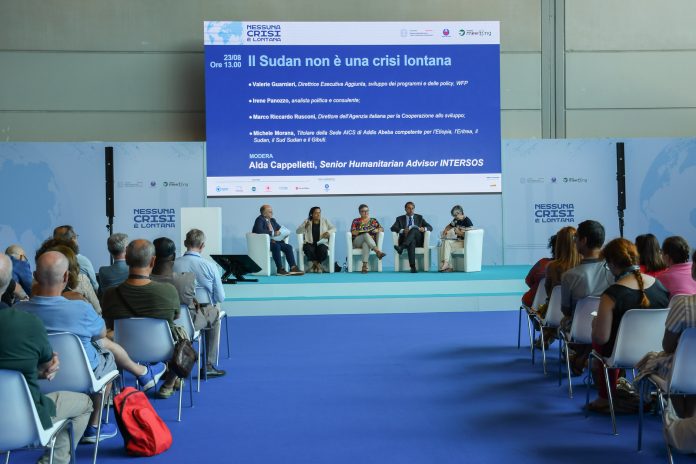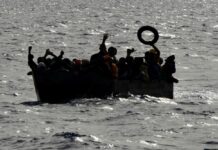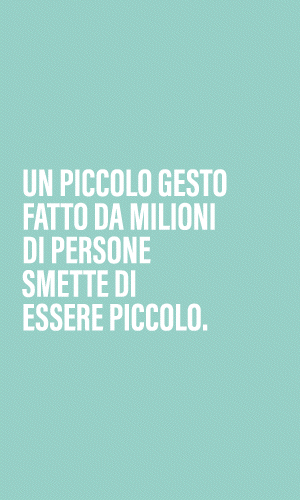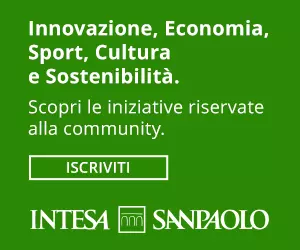RIMINI (ITALPRESS) – At the Rimini Meeting, the panel “Sudan Is Not a Distant Crisis”, organized by INTERSOS, brought together leading humanitarian and institutional voices: Valerie Guarnieri, Assistant Executive Director of the World Food Programme (WFP); Michele Morana, Head of the Italian Agency for Development Cooperation (AICS) office in Addis Ababa, overseeing Ethiopia, Eritrea, Sudan, South Sudan and Djibouti; political analyst and Horn of Africa expert Irene Panozzo; and Marco Rusconi, Director of AICS. The discussion was moderated by Alda Cappelletti, Senior Humanitarian Advisor at INTERSOS.
The debate made it clear that the war in Sudan, which erupted on April 15, 2023, has become the world’s worst humanitarian crisis, even as it remains largely absent from international political and media agendas.
“Sudan is not a distant country,” said Cappelletti. “It is a reality that concerns us closely, with both regional and global repercussions.” The conflict is being fought between the Sudanese Armed Forces (SAF), led by General al-Burhan, against the Rapid Support Forces (RSF), a paramilitary militia under General Hemeti. The war’s toll is devastating: over 14 million internally displaced people, 4 million refugees in neighbouring countries, at least 150,000 deaths— widely considered an underestimation — and 25 million people, half of Sudan’s population, facing acute food insecurity.
Political analyst Irene Panozzo traced the roots of the crisis: “This is not a clash born out of nowhere between two rival generals. For decades, SAF and RSF were part of the same security structure built by Omar al-Bashir’s regime. The RSF, heirs to the Janjaweed militias, were turned into a paramilitary force with access to economic resources, illicit trade, and mercenary networks. The fall of the regime in 2019 did not dismantle these structures but instead deepened underlying tensions.” She added that the conflict is fueled by “severe economic imbalances, control of gold mines, the involvement of regional powers such as the UAE and Saudi Arabia, and deep-rooted ethnic and territorial divisions.”
From the perspective of Italian cooperation, Michele Morana stressed the regional dimension: “Sudan is not only a country at war, but a crisis destabilizing Ethiopia, South Sudan, and Chad. We are currently running 16 projects worth €61 million, ranging from food security to vocational training. By working with local partners and Italian NGOs, we maintain a presence even in the most challenging areas. It’s an effort aimed at resilience and reconstruction despite extremely difficult conditions.”
Particularly moving was the testimony of WFP’s Valerie Guarnieri: “Half of Sudan’s population faces severe food insecurity. In Darfur, famine is already a reality. We have seen aid convoys attacked by drones, drivers killed, and cities like Al-Fasher under siege and cut off. People are surviving on waste or even household animals.” She underscored the lack of funding and the obstacles to humanitarian access: “Despite all the challenges, we manage to reach 4 million people every month—but it is not enough. A global mobilization is essential. We cannot leave Sudan in the shadows.”
Marco Rusconi reaffirmed Sudan’s importance for Italy: “Sudan remains a priority country for Italian cooperation. This is not just about emergency interventions but about laying the foundations for peace and development. Our approach combines neutrality, widespread presence, and strong support for civil society.”
He highlighted the strength of Italy’s cooperation network: “Our system is made up of institutions, NGOs, missionaries, universities, and civil society. It’s a unique force that allows us to stay where others withdraw.”
In closing remarks, speakers stressed that the Sudanese crisis is not a faraway tragedy but one that directly impacts regional stability, global food security, and the credibility of international institutions. “No crisis is distant,” Rusconi reminded. “Sudan demands that we do not look away.”
Experts also called on media and policymakers to break the silence. “Sudan is the world’s worst humanitarian crisis, yet it rarely makes headlines,” said Panozzo. “Telling stories of resilience, such as community kitchens organized by Sudanese civil society, is essential to prevent silence from becoming complicity.”
Guarnieri concluded with a stark appeal: “Aid is vital, but it is not enough. A political solution is needed—and it is needed now. The Sudanese people cannot wait.”
The meeting ended with a clear message: Sudan is not a distant crisis. It is an open wound demanding responsibility, solidarity, and urgent pathways toward peace.
-Photo: Meeting di Rimini –
(ITALPRESS)















